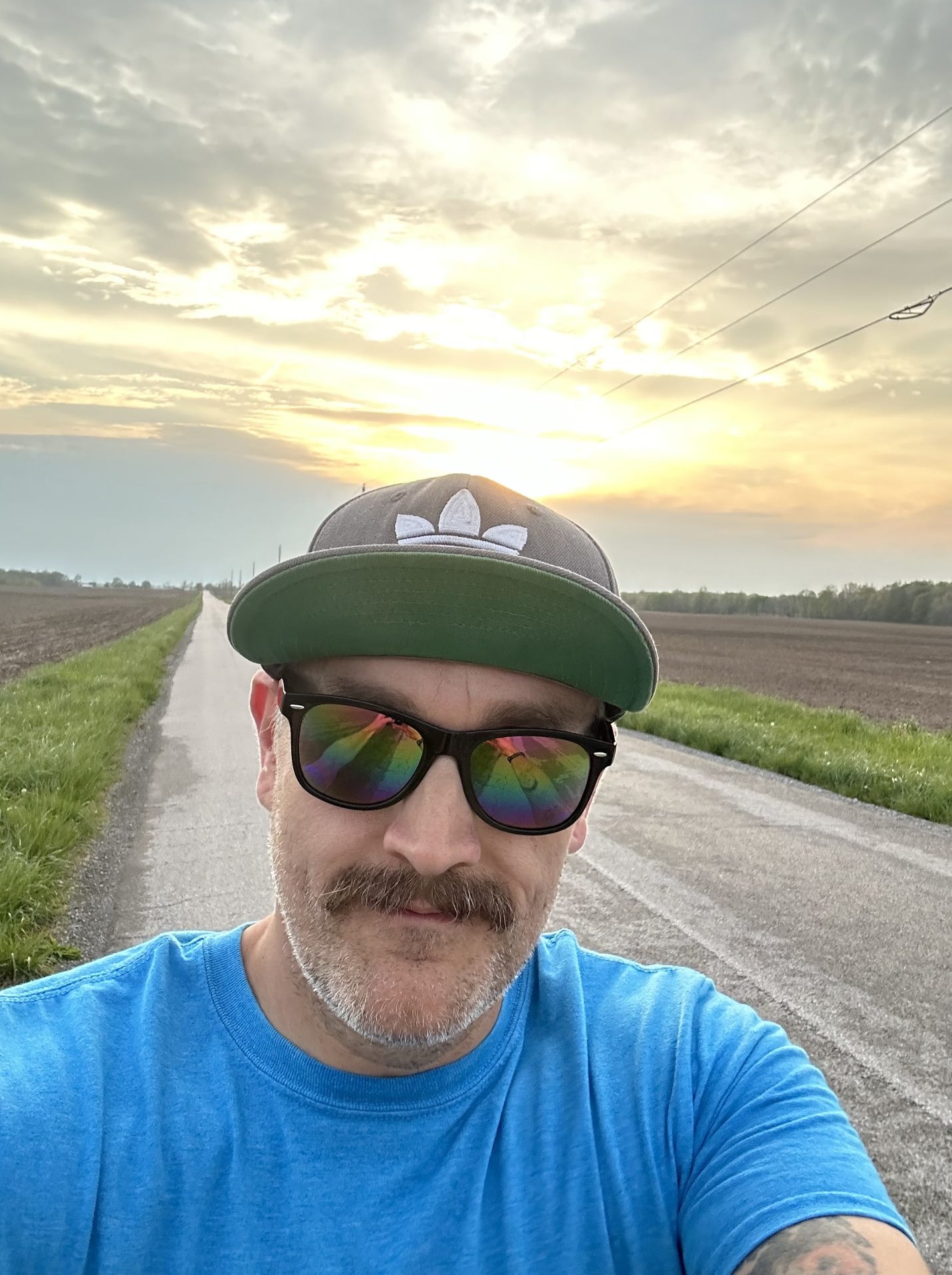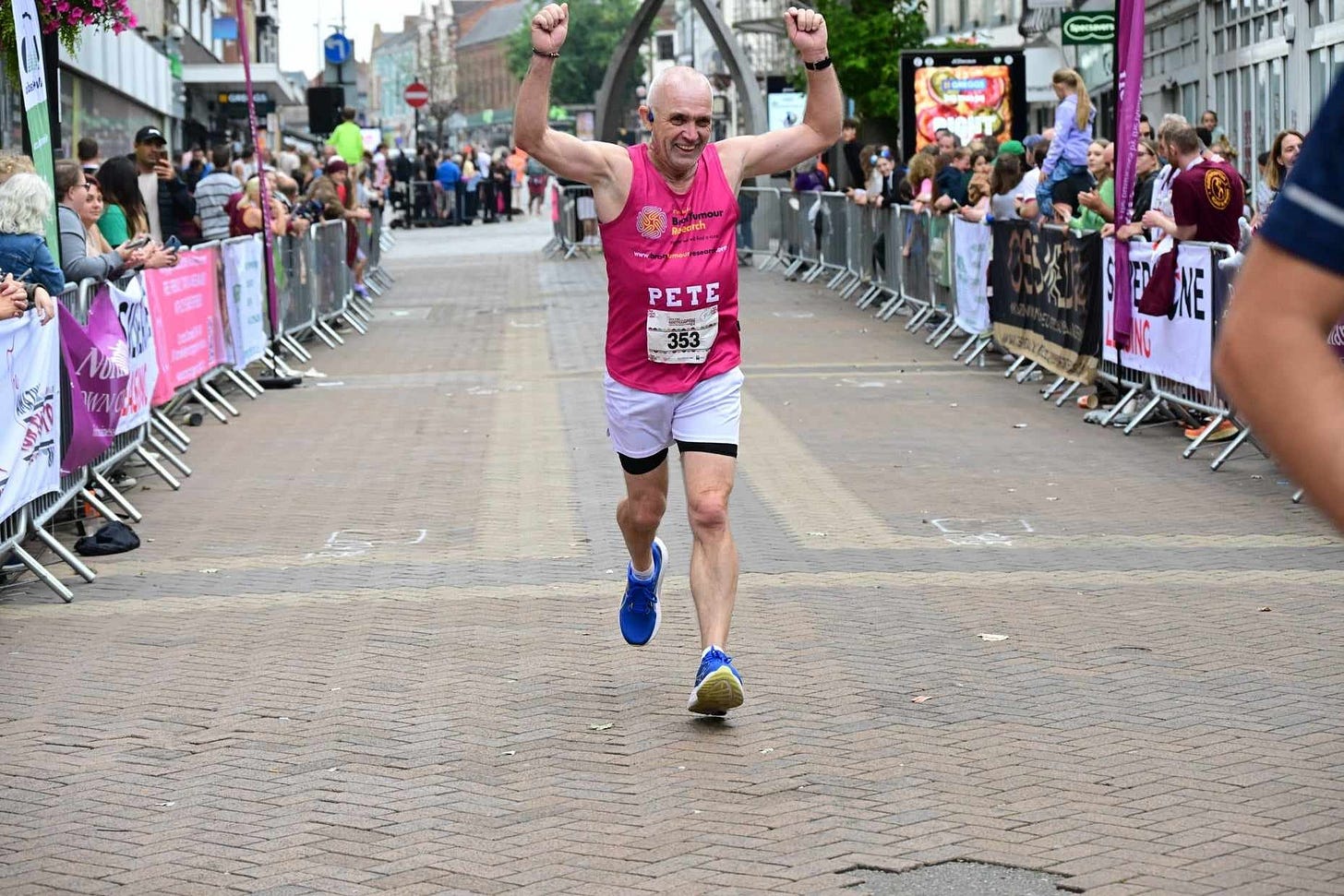Sobriety, running and podcasting - the Joe Hardin story
Joe Hardin hit more than one rock bottom before a phone call to his ex-wife sparked his journey to sobriety
Running Tales on Substack is a reader-supported publication. We make no money from advertising.
Please consider donating to help us do what we do ☕️

There was one constant throughout Joe Hardin’s sobriety journey.
But it wasn’t running.
The sport has helped Joe become a more positive, happier and confident person.
But it wasn’t there for him at 3am when he woke up in his truck having blacked out at the wheel.
When Joe really needed someone, it was his ex-wife, Cassie, that was there for him.
If proof is needed that Joe’s journey from alcoholic and substance abuser to podcaster and ultra runner is one of redemption, it comes from beyond the running world.
It comes with the news that Joe and the woman who helped changed his world remarried in March last year.
That’s not to say running has not been an integral part of Joe becoming the man he is today.
These days he is contemplating the challenge of a 200-mile race rather than the bottom of a glass.
When it comes to revealing how he turned his life around Joe is incredibly honest, an open book which he hopes others going through similar issues can take something from.
This is how Joe Hardin went from rock bottom to being reborn.
‘I thought I was going to die… so I gave up’:

Joe told Running Tales he struggled with substance abuse problems from a young age, the result of what he calls a “pretty volatile childhood” and a desire to find answers in the bottom of bottles or prescription pills.
By 2017 into 2018, Joe had given up on life. He became very ill as a result of an abscess on his lung that eventually caused it to collapse. Morbidly obese he was suffering from pancreatitis due to alcohol abuse and he had divorced his first wife.
He said: “I thought I was going to die anyway, so I just accepted it. I was broken. I was running out of rock bottoms and I would just find a new low every single time.
“I wasn’t always the best version of myself. Ten years ago, I was in pretty bad shape and I used to be embarrassed about who I was.”
Joe’s downward spiral continued when he remarried, entering into a relationship which he described as “fuelling the fire and water and gasoline all together”.
It was four-and-a-half-years ago when Joe reached what would turn out to be his last rock bottom.
On December 1, 2019, his “sobriety birthday” and a day he calls his rebirth, Joe “took my last drink. I took my last pill. I did my last drug.”
He said: “I knew that was it. I didn't have any more left in me. I knew I was running out, and I wasn't going to be long for the world if I didn't stop right then.”
Reaching that point did not come easily though. Joe’s journey to redemption began with a “big fight” with his then wife that resulted in him being thrown headfirst out of a bar.
“I got my truck and I took off and I passed out while I was driving,” he said.
“I woke up in a ditch. and I called my ex-wife (Cassie), the mother of my kids, and just talked. And she helped me.
“It always meant so much to me that the last person that she should care about, she would talk to at 3am.”
Listen on Instagram to our interview with Joe Hardin for the Running Tales Podcast:
Joe said the conversations didn’t stop there, with his former wife helping him through painful withdrawals and rehab treatment.
“We've since mended that relationship,” he said. “We actually got remarried on March 31 last year.
“I had this moment when I woke up in my truck that night that this is the last rock bottom that I've got.
“I had, as alcoholics call it, a moment of clarity.
“It was like a light bulb went off. And that was the last time - I’ve been clean ever since.
“And I didn't know that life could be this awesome. It was terrifying. But wow.”
How running helped Joe discover himself:
Although it wasn’t running which saved Joe, it has helped shape his recovery and “my continuing sobriety, especially overcoming mental health struggles and issues with anxiety”.
He said being sober “is one little slice of the pie” when it comes to recovery and self-improvement.
“I've used running as a big part of confronting questions like why am I an addict? Why do I behave the way I do?
“And running has certainly given me an understanding of who I am.”
As Joe has run longer and longer distances, he has learned to embrace who he is: “Especially with the ultra distance, you strip away all the crap on the outside.
“You really have to know who you are and why you're doing it.”
Joe’s discovery of the power of running came after his first sobriety birthday. Already feeling healthier and having lost weight due to stopping drinking, Joe decided to take the next step and join a gym.
The very next day he started training at 5am, initially walking on the treadmill for 30 minutes, three or four times a week.
At that time Joe said he was “ashamed to exercise in public,” but he slowly started to see mental and physical gains.
”There was a point in my life where I was on oxygen in the hospital,” he said. “I couldn't walk more than 100 hundred feet without needing oxygen.
“So to me, this was a miracle. I started lifting a few weights, doing some rowing, and then I saw this flyer for a Turkey Trot (races held in America on Thanksgiving).”
Also on Running Tales:

Start with “stupid” and end in success… What does it take to complete a 145-mile race?
Equality is for life, not just Pride Month - the inclusive mantra behind Run, Tri, Bike magazine
Joe said he had a “wild idea” to enter the race, competed over 5km. He told Running Tales that although the run itself was “a blast,” it had been the training which he most enjoyed.
“I missed the training part,” he said. “It turned out the race was just a little extra cherry on top.”
He quickly signed up for the Indy Mini-Marathon, a half-marathon event, and before he knew it was taking part in longer and longer races.
The lure of 100- and 200-mile races:
Joe told Running Tales: “I really, really fell in love with trail running.
“First of all, I didn't even know you could run in the woods. The first time I did, I ran with a buddy of mine and we were all gas, no breaks.
“We were running up hills. I was destroyed and realised this wasn’t the right way to do it.
“So I dove into YouTube and fell in love with the trail community. That’s how I got started into ultras.
“There's something about the long grind that really speaks to me. You really get down and dirty and learn who you are.
“Running in the woods breathes life into you. It’ll change your whole day, changes your whole outlook.”
Since completing an initial 50k race, Joe has taken on a succession of Backyard Ultras and long-distance trail races, including a 50-miler (80km) and a 100km (62 mile) race.
Thanks for reading and listening to Running Tales. We couldn’t do this without your support - please back us to keep going by…
He’s also signed up for his first 100-mile event (160km) - the Indiana Trail 100 takes place in October - and even has dreams of taking on the Oregon 200 next year.
“I just keep chasing distance,” he said, “and keep learning. This community is where I’m at.
“If tomorrow I can't run anymore, I'll still be a part of the trail running community in some capacity, whether it be volunteering, writing, whatever it is.
“Because they gave me a place where I fit in. And that's something I’ve never had in my entire life.
“I always felt like an outcast. I would always drink to chameleon my way into social circles.”
Since becoming part of the ultra community, Joe has realised his story is not as unique as he once felt it was.
He called ultra running a home for “misfit toys” where everyone can be comfortable together.
He added: “We’re all out here doing the same thing and suffering and laughing.
“The camaraderie is amazing. And it's just something I never had before. It's been a wild ride since I've been a part of it.”
Taking ‘big, scary steps’ into the world of podcasting:


These days, Joe is immersed in the running world to the point where he writes articles for Run, Tri, Bike magazine and is part of its Everyday Athlete Podcast Network.
On his Beyond The Finish Line podcast, Joe has spoken to the likes of John Swain - the man behind innovative running brand, Zip Running - and the founder of trail running magazine Hard Prairie, Chad Sullivan.
He also co-hosts the What’s in your Earbuds podcast, alongside Run, Tri, Bike’s Aum Gandhi. On that show, the pair talk about their favourite music to run to and how it not only fuels the performance of endurance athletes, but provides “a window to your soul”.
Those two shows are among seven that make up the network, including our own Running Tales Podcast.
Joe first became involved with Run, Tri, Bike after hearing about Aum’s own story of sobriety and how he had joined forces with fellow ultra runner Jason Bahamundi to promote the stories of regular runners.
After writing an initial article about his own story, Joe started regularly blogging on the platform. Not long after that he was invited to start his own podcast.
He said: “I got this email out of nowhere, and I couldn’t believe it was real. I screenshot it and sent it to my wife.
“The rest is history, and it has just been awesome. I get to talk to people and I learn something new every episode.”
Joe said one thing he has learnt from taking the plunge into podcasting is the importance of “showing up for yourself” and taking “big, scary steps”.
Asked if the man he was, who so often found solace in alcohol, would have believed he would one day be taking on such steps, Joe is certain.
“Absolutely not. I didn't know that I was capable of anything worthwhile.
“Honestly, I thought I would just drink and exist like I was before.
“If I talked to myself then, he would have thought I was full of it.
“It was tough to go through, but I needed to go through it, because now I know what it's like to feel this good. I don't always feel confident, I don't always feel worthy, but I'm working on that, and that's something we all have to work on.
“This is an ongoing project. I'm not fixed, but I want to share my journey as loudly as I can because I believe you have to recover out loud.
“This life is possible. You can get sober, you can get better.
“It's not easy. I can't believe I'm here sometimes. But I'm glad I am.”
Thanks as ever for reading and listening to Running Tales. We couldn’t do this without your support - please back us to keep going by…







